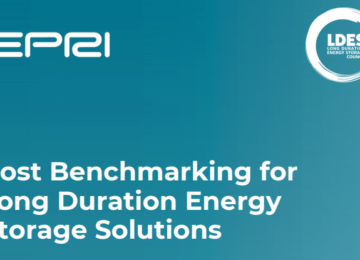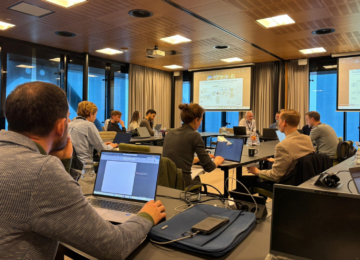Interview with Ilana Rooderkerk (D66)
The Lower House elections are just around the corner, and Energy Storage NL is curious to see how energy storage is included in the party programs of various political parties. In the run-up to the elections, Energy Storage NL is focusing on 'energy storage in politics'. For this campaign, we interviewed several members of parliament about what they think is the importance of energy storage in the energy system. This time our interview is with Ilana Rooderkerk, Member of Parliament on behalf of D66.
What do you think is the main added value of energy storage in the Dutch energy system, both in the short and long term?
More and more people are generating their own renewable energy and that is good news. Home-grown energy is important for the green economy of the future and makes us energy independent from countries like Russia with Putin or the US with Trump. But on days when there is less sun or when there is no wind, the importance of energy storage comes into play. Energy storage makes it possible to use renewable energy at any time, even when the sun is not shining or the wind is not blowing. In the short term, storage helps to absorb peaks and troughs in the supply of sun and wind, and to relieve the grid. In the long term, it is important for a reliable energy supply in a fully renewable energy system. This is good for the reliability and affordability of our energy system on the way to a sustainable future.
How do you view the role of energy storage as a structural solution to grid congestion? Do you think the potential of storage for this is already being sufficiently exploited?
People now find that new homes, schools and businesses sometimes cannot be connected to the power grid. We need to tackle this better in the next government, because it is frustrating and unnecessary. D66 has previously made proposals for this, such as investing in TenneT so that the infrastructure for offshore wind can be built more quickly. Energy storage can also help by absorbing peaks and using the grid more intelligently. That is why we want to support joint storage with, for example, neighborhood batteries. It is important that we do not see storage as an afterthought, but as part of an energy system in which we use energy as much as possible when it is available. This is how we make our grid future-proof.
The share of storage in the energy system is still very small at present. According to your party, what is the biggest reason why energy storage is not getting off the ground sufficiently in the Netherlands so far?
Many entrepreneurs and initiators want to, but get stuck in complicated rules that are no longer appropriate for our time. In addition, politicians often postpone or reverse long-term choices and entrepreneurs cannot invest with certainty. As a result, opportunities are missed. D66 wants to break through this. We want clear policy, fair market conditions and more room to invest in smart solutions such as storage. No swabbing policy, but investing in the green economy!
The sector lacks direction and direction from the government. Do you think the commitment to storage should be given much higher priority, and if so, how do you envision this (e.g., a national program or sector agreement for storage)?
Sure. As a government, you have to be bold and give direction. D66 wants energy storage to have a serious place in national energy policy. We want to facilitate the collective generation of energy. Joint energy sharing with the neighborhood and neighborhood batteries we want to actively support. Just as we did earlier for offshore wind. In this way we create clarity and trust and companies, governments and people can work together.
We do not yet know how much storage is needed where. Should policies, e.g., the National Energy System Plan, therefore include a target for storage, for example?
The National Energy System Plan is an ambitious plan, but it now falters when it comes to concrete action. The previous cabinet did not deliver on this, and a new cabinet must pick it up. Storage is not an end in itself but makes an important contribution to making the energy system flexible. It is important to properly map out where this can help entrepreneurs move forward and provide space on the power grid, for example through local generation of sun and wind, storage and mutual energy supply.
A profitable business case is often lacking, due in part to current transportation tariffs. Do you think the government should actively intervene here or do you see other ways to encourage storage from the government?
We must avoid smart solutions being held back by regulations that don't connect. If batteries reliably relieve the grid, we need to invest less and costs are saved. A lower tariff would fit with that. In addition, we can invest in knowledge, pilots and co-financing of projects. This is the only way to get the momentum going.
Subsidizing storage on a large scale is not possible now, for example, storage is not included in the SDE++. How do you look at that?
We think energy storage is important for more flexibility in the energy system and accelerating the energy transition. We want to encourage this by actively supporting neighborhood batteries for people and simplifying rules to better enable local generation and storage for companies.
The incorporation of storage locally is still very difficult. Should the national government take much more control of this by, for example, regulating land positions and permits for storage?
Many municipalities get stuck when expanding energy infrastructure due to lack of space, complicated rules or delays. D66 believes that the national government should help more in this regard. This can be done by designating locations, speeding up permit procedures and making smart choices together with provinces and municipalities. Energy storage can be part of this. It is important that the national government takes control of the entire energy infrastructure. And if necessary, the national government must also be able to take over competent authority to make projects possible more quickly.
How do we ensure that citizens also benefit from energy storage? For example, how do you look at encouraging or facilitating neighborhood or home batteries or decentralized heat storage?
More and more people want to contribute to the energy transition and we applaud that. D66 wants people to be able to actively participate and also benefit from energy generation. Even if you do not have a roof for solar panels, for example. Think of neighborhood batteries, heat networks or storage in cooperatives. The government can make this possible with subsidies, knowledge and cooperation with grid managers. In this way we ensure that the energy transition is fair and that everyone experiences the benefits.
Leading up to the election, what can we expect from your party in terms of energy storage - will this be a key issue in your climate and energy agenda?
As a climate party, we are making every effort to accelerate the energy transition and ensure greater affordability so that everyone can keep up. We also believe it is important to take the lead in international projects, including for hydrogen and the joint electricity grid. This includes storage for everyone who wants to participate in the sustainable future of the Netherlands.
Image: Martijn Beekman





